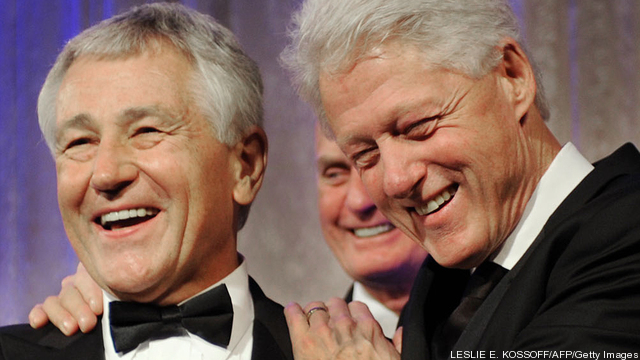
WASHINGTON: Former Republican Sen. Chuck Hagel, a serious contender to be the next Defense Secretary, may have given us a glimpse of his policies today as he argued today that diplomacy rather than military power is the way to resolve emerging global crises.
[Click here for an alternative view from another contender, Michele Flournoy — who would be the first-ever female Secretary of Defense]
Hagel gave a short address opening the Atlantic Council’s two-day conference discussion about a study of comprehensive global trends produced by the National Intelligence Council, the government’s preeminent intelligence thinktank. One of its main tasks is creating the global trends reports.
The NIC report, looking ahead to 2030, foresees the United States and Europe losing their status as the world’s economic powers to China and India. It also warned of the impact of aging populations and the growing competition for finite natural resources, such as water and energy. The council’s Strategic Foresight Initiative presented an alternative report that had a somewhat more positive view of America’s position in the future, while noting most of the same problems cited by the NIC.
Perhaps with an eye toward America losing its preeminent military position, Hagel argued that “engagement” is the key to address many international problems. In the national security world, engagement generally encompasses negotiations or multinational efforts. It has never been a popular tactic among most Republicans and some pro-military Democrats.
However, Hagel insisted that “engagement is not surrender, it’s not appeasement,” clearly taking on some of his GOP colleagues, who have slung around appeasement — associated with the foolish actions of British Prime Minister Neville Chamberlain as he tried to avert war with Germany — to describe some of President Barack Obama’s efforts to prevent international tensions from flaring into conflict.
Engagement is “an opportunity to better understand” others, Hagel said, and to bring “mutual self respect” among contesting parties. As the U.S. faces a litany of problems and potential crises in the future, he said, “we will need to turn our receivers on and our transmitters off.”
The emerging issues, Hagel said, “are beyond the control of any great power” and the U.S. “cannot solve them alone.” Instead, they must be addressed through alliances, through “joint thinking,” he said.
“Great powers have the responsibility to engage,” the former Nebraska senator said. In facing global challenges, “we don’t need a constant restatement of the problems. We need some deep thinking, questioning of past policies.”
Currently the president of the nonpartisan Atlantic Council, Hagel also touted the “Trans-Atlantic Alliance” — NATO — as the “only real security institution in the world today.”
Although a Republican, Hagel opposed former President George W. Bush’s decision to invade Iraq and, after leaving the Senate, he crossed party lines to support Obama’s 2008 presidential campaign. Administration insiders say he is being considered as a potential candidate to replace current Defense Secretary Leon Panetta, who is expected to retire some time next year.
If nominated and confirmed, he would be Obama’s second Republican defense secretary. Bob Gates stayed on for Obama after serving as Bush’s Defense Secretary.
Norway’s top officer on his ‘biggest challenge,’ next frigate and new NATO neighbors
Gen. Eirik Kristoffersen, Norway’s Chief of Defense, talks to Breaking Defense about his plans for spending on new frigates and subs, the challenges of upgrading Norway’s “digital backbone” and refilling the military’s stocks.



























